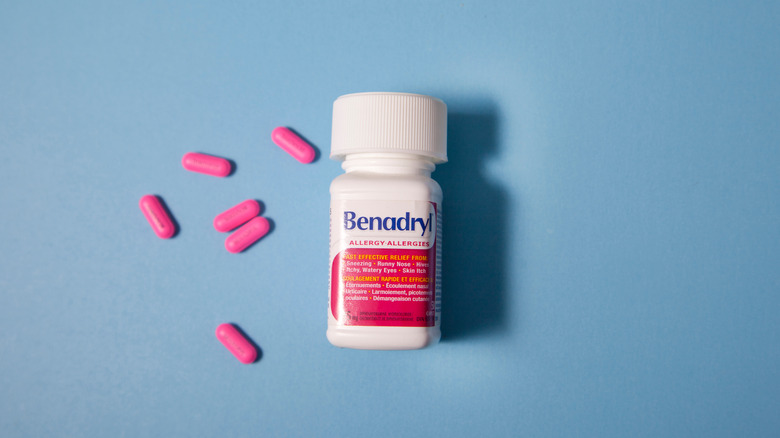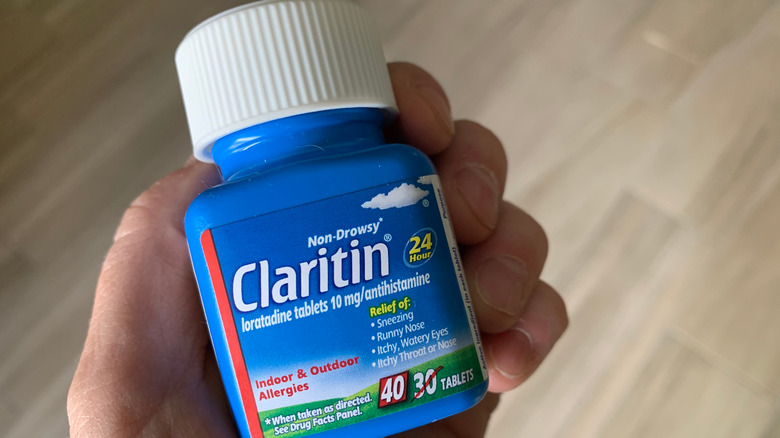Hidden Side Effects You Should Know Before Taking Benadryl
If you deal with seasonal allergies, the odds are high that you've tried taking Benadryl at some point in your life. According to Statistica, it's one of the best-selling allergy brands on the market, having raked in more than $150 million in 2017 alone.
On the off chance you haven't heard of the popular bright pink pill, it's an over-the-counter medicine that's classified as an antihistamine and primarily used to relieve the symptoms of hay fever, although it's often taken for other purposes due to its drowsy side effects (via Medical News Today). Its generic name is diphenhydramine and it comes in many different forms — some oral and others topical.
Whether you're just finding out about this medication or you've been taking it for years, it's important that you become aware of its side effects. This is especially pertinent in the midst of the "Benadryl challenge" trend on TikTok, which encourages viewers to take way too large of doses of the stuff in order to induce hallucinations (via Healthline).
For years, experts have been saying that taking too much Benadryl can cause serious health issues, but they have become even more vocal in the wake of the challenge. In fact, the manufacturer of Benadryl, Johnson & Johnson, even released a warning about the challenge and TikTok officials have promised to remove such posts from the platform (via Healthline). Here are all of the hidden side effects of Benadryl, along with which alternative medications you can take if you want to avoid them.
Some of the side effects of Benadryl are serious
According to Cindy Grant, the director of the Hillsborough County Anti-Drug Alliance in Florida, "many youth believe over-the-counter drugs, like Benadryl, are harmless. However, Benadryl, or diphenhydramine, has many side effects that can be dangerous or even fatal" (via Healthline). But what exactly are said side effects?
RxList cites drowsiness, dizziness, loss of coordination, dry mouth, upset stomach, constipation, blurred vision, dry eyes, and a hangover sensation as the most common side effects of Benadryl. These may not seem so bad, but the more serious side effects include painful urination, confusion, lightheadedness, pounding heartbeats, tightness in your neck or jaw, and uncontrollable movements of your tongue. The website suggests seeking immediate medical help if you experience any of these symptoms.
Because of these hidden side effects, pilots actually aren't allowed to fly for more than 30 hours after taking even a single dose of Benadryl (via Nationwide Children's). This affects children as well, as the sedative effects of the medication can significantly impair motor function and learning abilities, which can in turn have a negative effect on school performance, per Nationwide Children's.
Safer Alternatives to Benadryl
Although Benadryl has been one of the most common antihistamines since its introduction in the '40s, some doctors believe it wouldn't be approved if it had been introduced today. Writing for KevinMD, Dr. Roy Benaroch writes: "Back in 1946, medicines like Benadryl didn't have to pass the stringent safety and efficacy standards now required. And there's zero chance, today, it would have been approved for over-the-counter sale. Even if it made it as a prescription medicine, it would be plastered with warning labels."
Therefore, second-generation allergy medicines appear to be far safer as they adhere to more rigorous standards. These over-the-counter antihistamines include loratadine, fexofenadine, and cetirizine, which are sold under the brand names Claritin, Zyrtec, and Allegra. According to Nationwide Children's, each of these options last much longer than Benadryl, too — 18-24 hours compared to 4-6 hours — and have far fewer side effects. Mainly, they don't induce drowsiness.
So the next time you head to the pharmacy looking for a cure for your pesky seasonal allergy symptoms, you may want to reach for one of these newer medications instead of Benadryl. Of course, it's always a good idea to check in with your doctor to help you decide which option is right for you.


